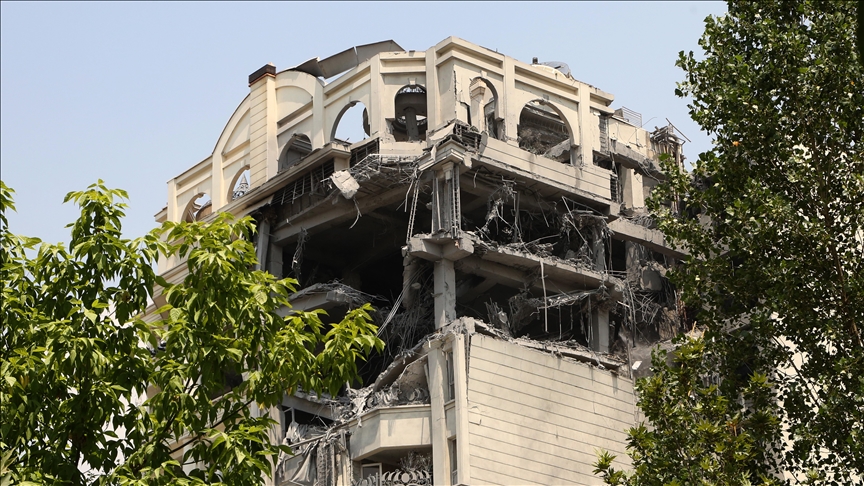European leaders call for de-escalation after Israel's airstrikes on Iran
Israel launched sweeping military operation against Iran early Friday, with strikes targeting its nuclear program and long-range missile capabilities
 Iran
Iran
ISTANBUL
European leaders on Friday issued calls for restraint and de-escalation following Israel’s overnight military strikes on Iran, warning of the risk of wider regional conflict and urging a return to diplomacy.
British Foreign Secretary David Lammy described the situation as a “dangerous moment,” posting on X that “stability in the Middle East is vital for global security.”
"Further escalation is a serious threat to peace and stability in the region and in no one’s interest," he said.
The UK's Prime Minister Keir Starmer echoed Lammy’s warning. "Escalation serves no one in the region. Stability in the Middle East must be the priority and we are engaging partners to de-escalate. Now is the time for restraint, calm and a return to diplomacy," he said.
Irish Prime Minister Simon Harris said he was “deeply concerned” by reports of “extensive military airstrikes by Israel on Iran overnight,” emphasizing that “the Middle East desperately needs peace and stability.”
“Further escalation would bring a very real risk of regional spillover. This would be disastrous for all the peoples of the region,” Harris said on X.
He added that Irish officials were in contact with the country’s embassy in Tehran regarding the safety of the small Irish community in Iran and were coordinating with EU partners.
France also expressed deep concern over the developments. Foreign Minister Jean-Noel Barrot said Paris was “closely monitoring the evolving situation in the Middle East, in close coordination with its partners.”
“We call on all parties to exercise restraint and avoid any escalation that could jeopardize regional stability,” he said.
"It is essential that all diplomatic avenues be utilized to de-escalate tensions," Barrot added.
German Chancellor Friedrich Merz said Berlin was in close coordination with France, the UK, and the US.
"We call on both sides to refrain from steps that could lead to further escalation and destabilize the entire region," Merz said, adding that Israel has “the right to defend its existence” and that Iran’s nuclear program “violates the provisions of the Nuclear Non-Proliferation Treaty and poses a serious threat to the entire region.”
Merz confirmed that Israeli Prime Minister Benjamin Netanyahu called him Friday morning to inform him of the strikes and their objectives.
Finnish Foreign Minister Elina Valtonen also expressed concern, saying the situation in the Middle East "is deeply concerning, and the cycle of military escalation must be brought to an end."
"Sustainable solutions to the region’s security challenges can only be achieved with political resolutions," she added.
Valtonen confirmed that the Finnish embassy in Tehran remains operational and in contact with Finnish citizens in Iran.
Belgium’s Foreign Minister Maxime Prevot described the developments as “a dangerous turning point,” warning that “any action that fuels further instability in an already volatile region” is deeply troubling.
"Belgium urges all actors to show maximum restraint and avoid escalation at all costs," he said on X.
“These military developments should not adversely affect diplomatic efforts: the negotiations table remains a much better option than the battlefield," Prevot added.
Spain’s Deputy Prime Minister Yolanda Diaz strongly condemned Israel’s actions, saying: "From the genocide in Gaza to the bombing of Iran: Netanyahu is dragging the world into a military escalation."
"We call for an urgent de-escalation, respect for international law, immediate sanctions on the Israeli regime, and a multilateral path toward a just and lasting peace for all peoples," she said.
Israel launched a sweeping military operation against Iran early Friday, with strikes targeting its nuclear program and long-range missile capabilities, Israeli Army Radio reported.
Israel declared a nationwide state of emergency and closed its airspace, diverting all flights to other countries, Hebrew-language media reported.
The Israeli army said a total of 200 fighter jets took part in the assault, dropping 330 munitions on various targets.
Army spokesperson Brig. Gen. Effie Defrin confirmed the strikes and said Iran responded by launching over 100 drones toward Israel.
Anadolu Agency website contains only a portion of the news stories offered to subscribers in the AA News Broadcasting System (HAS), and in summarized form. Please contact us for subscription options.







